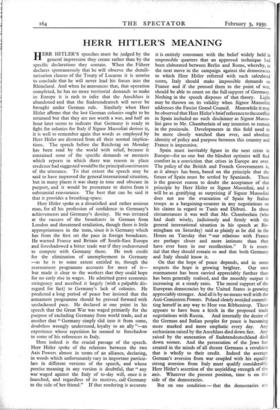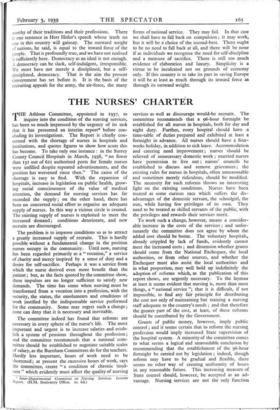HERR HITLER'S MEANING
HERR HITLER'S speeches must be judged by the general impression they create rather than by the specific declarations they contain. When the Fiihrer declares spontaneously that he will observe the demili- tarisation clauses of the Treaty of Locarno it is unwise to conclude that he will never lead his forces into the Rhineland. And when he announces that, that operation completed, he has no more territorial demands to make in Europe it is rash to infer that the Anschluss is abandoned and that the Sudetendeutsch will never be brought under German rule. Similarly when Herr Hitler affirms that the lost German colonies ought to be returned but that they are not worth a war, and half an hour later seems to indicate that Germany is ready to fight for colonies for Italy if Signor Mussolini desires it, it is well to remember again that words as employed by Herr Hitler are divorced from all their normal implica- tions. The speech before the Reichstag on Monday has been read by the world with relief, because it contained none of the specific demands or menaces which reports in which there was reason to place credence had suggested would be the principal constituents of the utterance. To that extent the speech may be said to have improved the general international situation, but in many places it was sharp in tone and obscure in purport, and it would be premature to derive from it substantial reassurance. The best that can be said is that it provides a breathing-space.
Herr Hitler spoke as a dissatisfied and rather anxious man, for all his profession of confidence in Germany's achievements and Germany's destiny. He was irritated at the success of the broadcasts in German from London and threatened retaliation, though there is little appropriateness in the term, since it is Germany which has from the first set the pace in foreign broadcasts. He warned France and Britain off South-East Europe and foreshadowed a bitter trade war if they endeavoured to compete with Germany there. He took credit for the elimination of unemployment in Germany —as he is to some extent entitled to, though the rearmament programme accounts for most of it— but made it clear to the workers that they could hope for no early rise in wages. He admitted grave economic stringency and ascribed it largely (with a palpable dis- regard for fact) to Germany's lack of colonies. He predicted a long period of peace but insisted that the armament programme should be pressed forward with unslackened pace. He declared at one point in his speech that the Great War was waged primarily for the purpose of excluding Germany from world trade, and at another that " Germany simply slid into it from some, doubtless wrongly understood, loyalty to an ally "—an experience whose repetition he seemed to foreshadow in some of his references to Italy.
Here indeed is the crucial passage of the speech. Herr Hitler spoke of the relations between the two Axis Powers almost in terms of an alliance, declaring, in words which unfortunately vary in important particu- lars in different versions of the speech, and whose precise meaning in any version is doubtful, that " any war waged against the Italy of to-day will, once it is launched, and regardless of its motives, call Germany to the side of her friend." If that rendering is accurate it is entirely consonant with the belief widely held in responsible quarters that an approved technique had been elaborated between Berlin and Rome, whereby, as the next move in the campaign against the democracies to which Herr Hitler referred with such calculated scorn, Italy should make impossible demands on France and if she pressed them to the point of war, should be able to count on the full support of Germany.
Nothing in the speech disposes of that theory. Light may be thrown on its validity when Signor Mussolini addresses the Fascist Grand Council. Meanwhile it may be observed that Herr Hitler's brief reference to the conflict in Spain included no such disclaimer as Signor Musso- lini gave to Mr. Chamberlain of any intention to remain in the peninsula. Developments in this field need to be more closely watched than ever, and absolute identity of policy and purpose between this country and France is imperative.
Spain must inevitably figure in the next crisis in Europe—for no one but the blindest optimist will find comfort in a conviction that crises in Europe are over. The policy of the British and French Governments is, as it always has been, based on the principle that the future of Spain must be settled by Spaniards. There is the gravest reason to doubt the acceptance of that principle by Herr Hitler or Signor Mussolini, and it will be as gratifying as surprising if Signor Mussolini does not use the evacuation of Spain by Italian troops as a bargaining-counter in any negotiations on his claims in regard to Tunis and Djibuti. In those circumstances it was well that Mr. Chamberlain (who had dealt wisely, judiciously and firmly with the general international situation in his speech at Bir- mingham on Saturday) said as plainly as he did in the House on Tuesday that " our relations with France are perhaps closer and more intimate than they have ever been in our recollection." It is essen- tial that they should remain so and that both Germany and Italy should know it.
On that the hope of peace depends, and in some respects the hope is growing brighter. Our own rearmament has been carried appreciably further than has been generally realised, and the monthly output is increasing at a steady ratio. The moral support of the European democracies by the United States is growing appreciably stronger. And all is by no means well with the Anti-Comintern Powers. Poland clearly avoided commit- ting herself in any way to Herr von Ribbentrop. There appears to have been a hitch in the proposed trade negotiations with Russia. And internally the desire of the German and Italian peoples for peace is becoming more marked and more emphatic every day. Any enthusiasm raised by the Anschluss died down fast. Any raised by the annexation of Sudetendeutschland died down sooner. And the persecution of the Jews has created in the minds of all decent Germans a revulsion that is wholly to their credit. Indeed the average German's aversion from war coupled with his equally strong aversion from Italy must qualify considerably Herr Hitler's assertion of the unyielding strength of the axis. Whatever the present position, time is on the side of the democracies.
But on one condition — that the democracies aTe worthy of their traditions and their professions. There is one sentence in Herr Hitler's speech whose truth no one in this country will gainsay. The outward weight of nations, he said, is equal to the inward force of the people. That is profoundly true, and we have not realised it sufficiently here. Democracy as an ideal is not enough. A democracy can be slack, self-indulgent, irresponsible. We must have not merely a disciplined, but a self- disciplined, democracy. That is the aim the present Government has set before it. It is the basis of the recruiting appeals for the army, the air-force, the many forms of national service. They may fail. In that case we shall have to fall back on compulsion ; it may work, but it will be a choice of the second-best. There ought to be no need to fall back at all, and there will be none if as individuals we recognise the need for self-discipline and a measure of sacrifice. There is still too much evidence of elaboration and luxury. Simplicity is a virtue to be inculcated not on grounds of economy only. If this country is to take its part in saving Europe it will be at least as much through its inward force as through its outward weight.











































 Previous page
Previous page